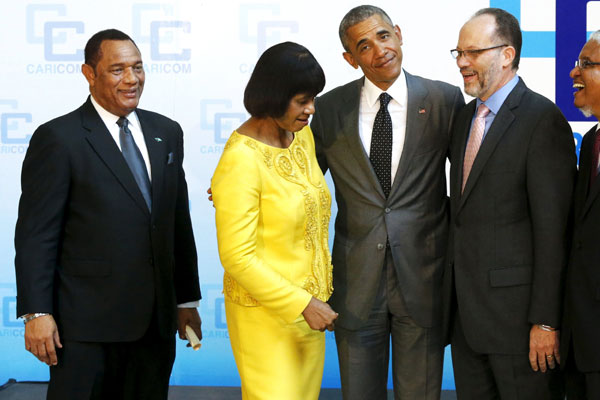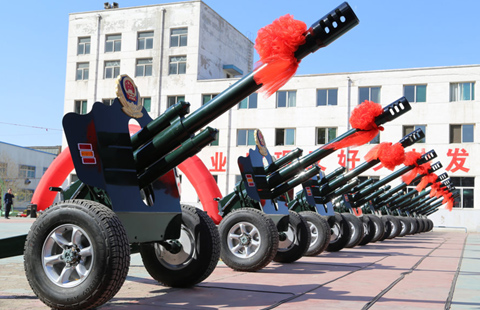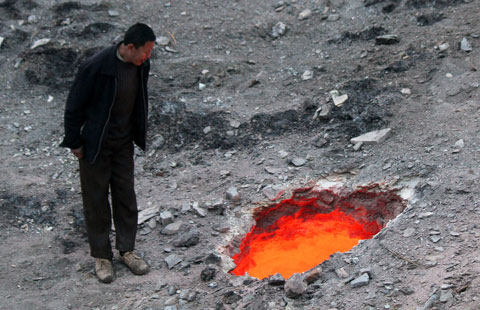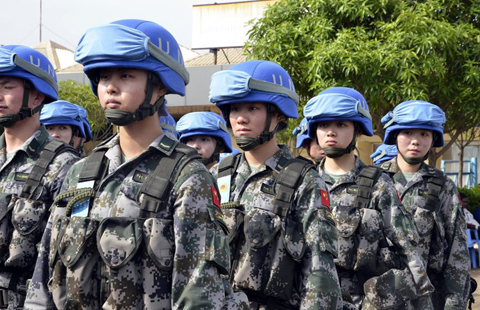Obama seeks to renew predominance over Caribbean through energy initiatives
Updated: 2015-04-10 16:47
(Xinhua)
|
||||||||
 |
|
US President Barack Obama reacts as Jamaica's Prime Minister Portia Simpson Miller (2nd L) insists on standing next to him after moving aside Bahamas Prime Minister Perry Christie (L), as Obama joins a meeting of the leaders of CARICOM, the Caribbean Community nations, at the University of the West Indies in Kingston April 9, 2015.[Photo/Agencies] |
KINGSTON -- US President Barack Obama met heads of government of the Caribbean Community (CARICOM) in Kingston on Thursday and announced new initiatives on energy cooperation, which seems intended to counteract Venezuela's influence in the region.
"A particular focus today is going to be one of the greatest barriers to development in the Caribbean, and that is expensive, often unreliable carbon-intensive energy," said the US president, who was on his visit to Jamaica.
Besides the focus on energy, Obama also mentioned other issues including securing economic growth, furthering regional integration, upholding human rights and combatting transnational crime.
Obama said the United States has launched the "Caribbean Energy Security Initiative" aiming to help move the region toward cleaner, more affordable energy, noting that the Caribbean has some of the highest energy costs in the world and is particularly vulnerable to the effects of climate change.
"Today, we're announcing new partnerships, including a new fund to mobilize private investment in clean energy projects in the Caribbean and in Central America," he told the CARICOM leaders at the meeting.
The United States will launch a 20-million-US-dollar facility to encourage investment in clean energy projects. The facility will provide early-stage funding to promote greater private and public sector investment in clean energy projects, according to a White House statement released right after Obama's speech.
Other measures include forming an energy security task force partnered by the United States and Caribbean and Central American countries to evaluate progress in the cooperation and identify steps to advance energy sector reform and clean energy development.
Critics say the Obama administration's new move aims to squeeze Venezuela's influence in the region.
Late Venezuelan President Hugo Chavez created Petrocaribe, an oil trade program, in 2005 to sell fuel to Latin American and Caribbean nations at cheaper prices and help financing their oil infrastructure projects.
Under Petrocaribe, Venezuela allows 17 countries, including 12 CARICOM members, to purchase its oil at market prices but only pay a small percentage of the cost upfront, and the balance can be paid over 25 years at one percent interest.
The program has kept much of the region dependent on subsidized oil imports from Venezuela, which the United States claims is dangerous to those countries' macro economy.
- Bird flu outbreaks reported in two Mexican states
- Failed developer shoots dead 3, injuries 2 at Milan courthouse
- People rescue beached dolphins in Japan
- Indonesian children's risky shortcut to get to school
- S.Korea, US to hold joint exercises
- Last batch of Chinese peacekeeping infantry arrives in S.Sudan

 Ten photos you don't wanna miss of today
Ten photos you don't wanna miss of today
 Amur tigers come back from the brink
Amur tigers come back from the brink
 Guns prepared to mark Anti-Fascist War anniversary
Guns prepared to mark Anti-Fascist War anniversary
 Tibetans' viral wedding photos contrast city with country life
Tibetans' viral wedding photos contrast city with country life
 Strange but true: Three times a lady
Strange but true: Three times a lady
 Road to Cuba
Road to Cuba
 Trending: 'Gateway to hell' found in Urumqi
Trending: 'Gateway to hell' found in Urumqi
 Last batch of Chinese peacekeeping infantry arrives in S.Sudan
Last batch of Chinese peacekeeping infantry arrives in S.Sudan
Most Viewed
Editor's Picks

|

|

|

|

|

|
Today's Top News
US, Cuba hold highest-level talks since 1961
UN official praises new website that engages Chinese public
Hillary Clinton expected to announce presidential run soon
Shooting outside Washington DC leaves 1 injured
Blocking of chip exports could backfire: scientist
US to help China fight tough TB strain
Rush for H-1B visas is on
Tibetan lawmaker meets US Rep
US Weekly

|

|






